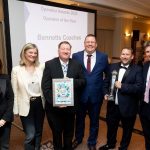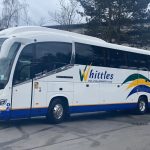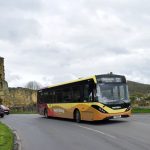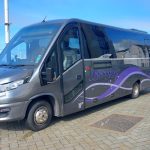The most successful businesses find a niche and then stick with it. That’s what Luton-based 7 Plus Travel did in 2011, and in the six years since then it has developed into a corporate minicoach specialist
Many minicoach operators start with one vehicle and go from there. Luton-based 7 Plus Travel, run by brothers Aqeel, Khaleel and Shakeel Ahmed, is no different.
But throughout its growth, it has kept a close eye on the bottom line and worked as efficiently as possible.
7 Plus Travel was founded in 2011, and its business model then was a lot different to what it is now. The brothers all had experience of the taxi industry, and they almost fell into operating an LDV Convoy under a restricted O-Licence on a contract for an employment agency.
“That got us off to a good start, and we put a second vehicle on the road to service the same contract,” says Aqeel.
“I have founded businesses in the past and I know that the first year is often a struggle. Taking temporary staff to and from Hemel Hempstead for the employment agency gave us a good income stream. It was an excellent foundation.”
A block to further expansion was the initial restricted licence. Once that shackle had been thrown off, 7 Plus Travel was free to push on and target the private hire market, which now provides the bulk of its work.
Corporate target
“When we were granted a standard O-Licence, we needed better vehicles. There was nothing wrong with the LDVs but we wanted something that would appeal to corporate customers,” Aqeel continues.
One hurdle to negotiate as part of that will be familiar to all newly-formed businesses: Finance. Additionally, the prospect of taking on a second-hand minicoach that had been built to someone else’s specification didn’t appeal, and so a novel solution was found.
“We sourced a Mercedes-Benz Sprinter 515CDi van that dated from 2007. It was a few years old but it was in very good condition, and we set out to have it transformed into a minicoach,” says Aqeel.
Discussions began with a handful of converters, and Doncaster-based Excel got the nod thanks to Sales Director Peter Vernon’s approach. “We decided on the configuration, and Excel created it. Its standard of work was excellent and that minicoach remains in our fleet today. It has served us very well and it is one of our most popular vehicles.”
Fair day’s pay…
Although 7 Plus Travel was founded on contracts, they form only a small part of its current workload in the form of two school runs. The perennial issue of poor rates has precluded more education-related duties.
“In the beginning it was all very clear: We would do contract and corporate work and that would develop into a profitable business,” says Aqeel.
“Then I spoke to another operator. Luton has lots of competition, and our business cannot be successful just by bidding on contracts. Rates are rarely good enough, and there is little for drivers and vehicles to do during the rest of the day.”
It would in theory be easier to accept less lucrative work on the basis that it’s a guaranteed income during quieter times, but while the brothers are relative newcomers to PCV operation, they are not new to the realities of business.
“It cannot be a case of ‘suck it and see’ with a contract. It has got to be worth doing from the outset. If the rate isn’t good enough, it’s easy to find yourself in trouble because you’ve underpriced. Then you are, in effect, working for nothing.”
Keeping vehicles as busy as possible is key. When miniplus visited, the first had left at 0300hrs that morning on a Heathrow Airport transfer.
Eggs in many baskets
That gives an indication of what’s become a broad focus. 7 Plus Travel’s fleet is modestly-sized at five, but Aqeel’s experience in IT means that he has been able to guide the development of four separate websites, each aimed at a particular market segments.
Each has a slightly different brand. At one extreme the target audience is those seeking corporate minicoach hire with a bespoke service, and who are prepared to pay for that. At the other, customers wanting a simple airport transfer are the target. That strategy works well, but it requires close management.
Plans are in hand to simplify dealings with customers by using an app. “It’s important to put technology in our favour, and also to make hirers’ lives easier,” says Aqeel.
“If we have an app to generate quotes and hold all the information on bookings for immediate retrieval, it will give us an edge. Technology can ensure that information is updated in one central place, and it will remove lots of to-ing and fro-ing.”
New metal
Finding a suitable van and converting it to a minicoach proved impossible to repeat when the need arose for a further high-specification addition, and again, the second-hand selection was not ideal.
“With used vehicles, you don’t always get what you want. You get what someone else wanted,” says Aqeel. Then the brothers came across Cento. The Romanian converter has an agent in the UK in Vamplew Delta Services, and its product was appealing.
The upshot was that an order for a 22-seat extended minicoach was placed; Cento claims that it is in the unique position of being able to offer a towbar on a lengthened conversion, so luggage capacity is not an issue.
“We were umming and aahing between 19 seats and a boot and 22 seats, but we are a passenger transport operation, and the more people that we carry, the better. So we went for 22 and left the option of a trailer open,” he continues.
“There are days when I wish that we went for fewer seats, but 22 passengers is a unique selling point locally. Once we started to market the Cento, we got a lot of calls from people that we hadn’t dealt with before, because its capacity was a new thing for us.”
The Cento is finished to a high specification. Initially, there was a sense of ‘too good to be true’ around the asking price, but Khaleel visited the factory and came back confident in the product.
Looking after staff
Part of the specification exercise on the Cento was asking drivers what they value. The lumbar support on the standard Sprinter seat was criticised, so extra was spent on a top-of-the-range type instead. Other minor cab upgrades were also added.
“If the driver is not comfortable, you’re off to a bad start,” says Aqeel. “The minicoach ended up costing more than it might have done because of what we added, but it is money well spent in our view.”
Also selected was the 3.0-litre V6 engine option and an automatic gearbox. Both add to driver appeal, and the 7G-Tronic is particularly important on work that regularly takes the Cento into central London.
Drivers’ input was important; recruiting is sometimes tricky, but the main focus is on ensuring that enough are available across the summer peak.
Cover is provided by a number of part-time and casual staff, and the brothers each have a category D licence.
But as the business has continued to grow, there is less reliance on Aqeel, Khaleel and Shakeel being on the road; instead, their focus is entirely on running operations.
What next?
Growth is set to continue. An application has been submitted for two further licence discs, and in 2018 attention will likely turn to expanding the fleet.
As yet no decision has been made on which size category any addition will fall into, but a 29-seater is possible.
“So far we’ve taken it easy with vehicles. We have concentrated on doing what we do already as well as possible, and using everything available to help with that.
“But a 29-seater might be the next step. It would have to be something that we could market to our corporate customers so we’d be looking for something at the top of the range.”
Moving up to being an operator of full-size coaches is not on the to-do list at 7 Plus Travel. Its name says everything about the market segment that it targets. But with ambitious owners, a hard-won niche and a focus on efficiency, it’s in a good place already.























